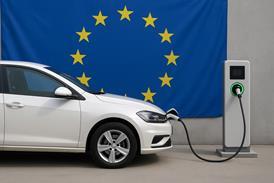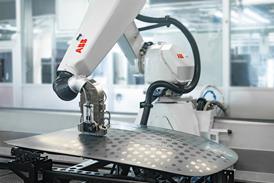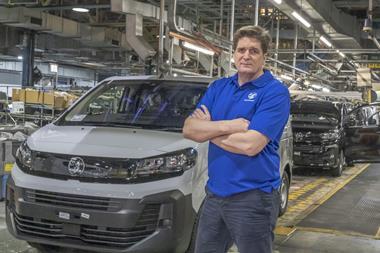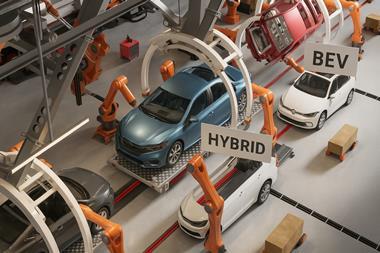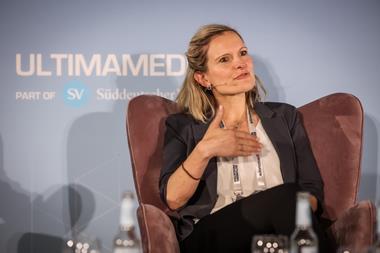A new plant has been born in an extremely turbulent political environment – Volvo’s first in the US. Michael Nash reports

Volvo Cars has officially opened its first plant in the US. Construction began at Charleston, South Carolina, back in 2015, with president and CEO Håkan Samuelsson highlighting the importance of local production in helping reach both growth and profitability targets. The facility is now the sole production site for the new S60 sports sedan, which is based on the OEM’s scalable product architecture (SPA) platform.
“The Charleston plant establishes the US as our third home market,” Samuelsson said during the inauguration event. “The sedan segment and the SPA platform’s proven ability to boost profitability offer significant growth opportunities for Volvo Cars in the US and globally.”
The plant was originally meant to make 100,000 units a year, but will have the capacity for 150,000. It covers an area of 2.3m sq.ft, and will have around 1,500 members of staff working at it by the end of 2018. The OEM has spent a total of US$1.1 billion, though only US$500m was initially earmarked for the facility.
The S60 is the first model in the Volvo Cars line-up to be sold without a diesel offer, reflecting the company’s plan to “go all electric” by 2019 – a strategy outlined in July 2017 that means every car launched will incorporate some level of electrification, be it a mild hybrid system or full battery electric drive. The plant is not yet fixed to produce electrified vehicles, but according to Samuelsson, this could be achieved with a “rather minor” investment.
Slow and steadyAs well as the S60, Charleston will also house the production of Volvo’s best-selling SUV, the XC90, from 2021. The OEM has not clarified the reason behind this delay, as the SUV shares the same SPA platform as the S60, which should mean production of the models side-by-side is fairly straight forward.
In a recent interview with AMS, Ulf Nordelöf, senior director of industrial strategy at Volvo, explained that the company’s plant in Gothenburg, Sweden, is benefitting from making cars only based on the SPA platform. “Over the course of three or four years we have gone from making cars based on three different platforms to using just one platform, and have also launched five new vehicles, which doesn’t include the V60,” he recalled. “We have had the courage to do what the book tells you not to do – change the process, change the product portfolio and, on top of that, increase output.”
But the cautious approach that Volvo is taking at Charleston is praised by Mike Graney, vice president for global business development at Charleston Regional Development Alliance (CRDA). He told AMS that it is important for the OEM to overcome the temptation of doing too much too soon.
“Getting an automotive plant up and running is a marathon not a sprint,” he stated. “Volvo is smart to scale at a modest rate, which is how BMW first approached it 30 years ago. We anticipate Volvo will grow vehicle production in conjunction with building its brand presence in the US and beyond. It’s an exciting time for all of us in Charleston.”
Back in 2015 when it announced it was going to build a factory in the US, Volvo outlined some of the reasons behind its decision in choosing Charleston. Top of the list was easy port access, as the city is located on the east coast, in order to import parts and export finished cars. Around half of the vehicles made at the plant will be sold in the US market, while the other half is likely to be exported. A well-trained labour force and experience in the manufacturing sector also featured as high priorities.

According to the CRDA, the Port of Charleston boasts the deepest harbour in the south Atlantic, providing companies like Volvo with access to over 150 countries around the world. When it comes to workforce, around 33% of people employed locally have a bachelor’s degree or higher. The city’s population is also rapidly growing – between 2010 and 2016 it rose four times faster than the US average, and twice as fast as South Carolina’s average.
This could be partly due to the fact that more companies like Volvo are investing in the area. “Global trade and investment drive the Charleston metro’s booming economy, and international companies and talent have deep roots and relationships in our community,” Graney continued. “For more than 30 years, the state of South Carolina has built expertise in automotive manufacturing, starting with BMW in the upstate and Robert Bosch in Charleston. We offer comprehensive workforce training programs, a business-friendly climate, and aggressive incentive packages that are second to none.”
A spokesperson for CRDA added that Charleston is “proud to be home to the first two new vehicle assembly plants announced in the US following the Great Recession… Charleston offers the workforce and talent companies need to succeed and grow. Even with recent successes such as Boeing, Volvo, and Daimler expanding in the market, Charleston’s labour pool offers more opportunities for continued business growth.”
Global growthWith “continued growth” in mind, Volvo’s move to make cars in the US comes at a time when it has been achieving record sales figures. In terms of global results, the company delivered a total of 317,639 units during the first half of 2018, equating to a 14.4% increase compared to the same period in 2017. Its largest market was Europe, with 164,480 units sold in the first half of 2018. China was second with 61,480 units, while the US came in third with 47,622.
However, the biggest rise in sales occurred in the US at 39.6%, with China and Europe up by 18.4% and 5.7%. Demand for the XC90 in the US during May and June of 2018 grew by 30.1% and 17.4% respectively when compared to the same months in 2017.As well as building the US factory, the company has announced that it would boost output capacity at its plants in Europe and Asia to keep up with “overwhelming demand” for its XC40 small SUV. The model is based on the compact modular architecture (CMA) platform that was jointly developed by Volvo and its sister brand Lynk & Co.
“The XC40’s success has surpassed even our highest expectations,” commented Samuelsson. “The small SUV segment is the fastest-growing segment in the industry now, and with these additional CMA-based models we expect to benefit further from that growth.”The company did not clarify how many vehicles the plants in Ghent, Belgium, and Luqiao, China, would be able to produce after expansions take place. However, both factories are soon to be home to the production of Lynk & Co 01 – another SUV, and the first model released under Geely’s new marque.
"Volvo is smart to scale at a modest rate, which is how BMW first approached it 30 years ago. We anticipate Volvo will grow vehicle production in conjunction with building its brand presence in the US and beyond" - Mike Graney, CRDA
Political volatilityThe opening of the Charleston plant comes at a very tricky time in the world’s automotive industry. US President Trump has caused a stir by threatening a trade war with China and introducing tariffs on as much as US$400 billion in Chinese goods. Authorities in Europe have suggested that these actions could have a knock-on effect across the world.
But Samuelsson remains unfazed. “First of all, with all the nervousness we have now in the business, we are very glad that we are here now with a local factory. Without that we would be even more worried about the future,” he said in a recent interview with Bloomberg Television. “We looked into various alternatives and we came to the conclusion that it’s important for us to be local in the US, create credibility with our partners, retailers, but also come closer to consumers. Learn about their preferences so that we can build even better cars for them in the future.”
Around 50% of parts used in its S60 are produced locally in the US, while other components come from Mexico and Europe. Samuelsson said that he is a firm believer in “open trade, but it should go two ways.” In other words, he thinks that Volvo should be able to benefit from a supply chain that is undisrupted by tariffs, and that it should be free to export vehicles around the world. Without these measures, the cost of its vehicles could rise. “I hope we can meet at a low duty level, not a high one. That will be the most beneficial solution for the consumer,” he added.
Although the new Volvo plant was being built before he was voted US President, some media outlets have suggested that the opening of Charleston reflects the success of Trump’s plan to coax more manufacturing operations into the US. However, if tariffs threaten to increase the end cost of Volvo vehicles for the consumer, future expectations for production ramp up and rising demand for its models could be a pipe dream for the Swedish company.































